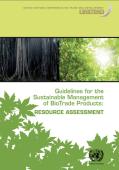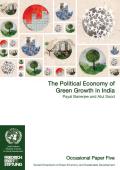
These guidelines will focus on the assessment of managed resources by providing additional detail, key ecological concepts and methodologies for completing a resource assessment, and guidance to incorporate findings into management plans and monitoring systems.
The present document complements the guidelines developed by UNCTAD (2009) for the development and implementation of management plans for wild collected plant species used by organisations working with natural ingredients.
Section 2 will feature examples of applied resource assessments using specific case studies for three traded species based on two information sources: existing cases of UNCTAD BioTrade partners and examples from scientific publications or project reports.

Rapid economic growth in India during the last two decades has accentuated the demand for energy and natural resources related to water, land and forests. Based on a review of the current policy framework in these areas and data from fieldwork in the northeastern region of India, this paper addresses two inter-related themes: (i) how emerging economies like India have dealt with the question of access to resources in response to the opposing demands of inclusive growth and social divides; and (ii) the specific case study of the 'Green Mission' and hydroelectric power (HEP) dams on the river Teesta in India’s northeastern Himalayan region.
This summary was prepared by Eldis.
This report sets out WWF's perspectives on green economies – why they are needed, what they are, and how to get there – and shows how WWF is working around the world to make the shift to green economies happen. This report also suggests some priority actions that governments in the UK should take to foster the conditions for sustainable innovations to flourish in businesses and communities.
It is estimated that transitioning to a low-carbon, and climate resilient economy, and more broadly “greening growth” over the next 20 years to 2030 will require significant investment and consequently private sources of capital on a much larger scale than previously. With their USD 28 trillion in assets, pension funds - along with other institutional investors - potentially have an important role to play in financing such green growth initiatives.
Green projects - particularly sustainable energy sources and clean technology - include multiple technologies, at different stages of maturity, and require different types of financing vehicle. Most pension funds are more interested in lower risk investments which provide a steady, inflation adjusted income stream - with green bonds consequently gaining interest as an asset class, particularly - though not only - with the SRI universe of institutional investors.
Quoting a joint analysis undertaken by the OECD and the IEA, G-20 leaders committed in September 2009 to "rationalize and phase out over the medium term inefficient fossil-fuel subsidies that encourage wasteful consumption." This report draws on previous OECD work to assess the impact on international trade of phasing out fossil-fuel consumption subsidies provided mainly by developing and emerging economies. The analysis employed the OECD’s ENV-Linkages General-Equilibrium model and used the IEA’s estimates of consumer subsidies, which measure the gap existing between the domestic prices of fossil fuels and an international reference benchmark. It shows that a co-ordinated multilateral removal of fossil-fuel consumption subsidies over the 2013-2020 period would increase global trade volumes by a very small amount (0.1%) by 2020. While seemingly negligible, this increase hides the large disparities that are observed across countries (or regions) and products. Under the central scenario, which assumes a multilateral subsidy removal over the 2013-2020 period, trade in natural gas would be most affected, with a 6% decrease by 2020.
